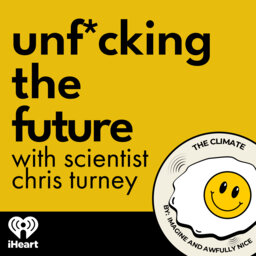Expanding The Movement with Bill McKibben
Author and activist Bill McKibben joins the show to talk about how he's trying to bring climate action to an overlooked group: Boomers.
Show notes from Chris:
- We need to get as many people activated as possible, so get involved and share your passion, intelligence, and empathy with family, friends, and colleagues. There are many groups to help you get started and learn more. It’s a wonderful sign of the progress we’re seeing around the world that there are so many groups. But for a great place to start, check out 350.org, the Sunrise Movement, and of course, ThirdAct.org.
- If you want to learn more about how fossil fuel companies have outspent clean energy groups by an eye-watering 27 times, there is a great article here in The Conversation.
- Bill’s latest book is “The Flag, the Cross, and the Station Wagon”. You can read a great review here.
In 1 playlist(s)
Unf*cking the Future
Unfucking the Future takes us on an environmental journey with our knowledgeable guide, scientist Ch…Social links
Follow podcast
Recent clips

Blue Carbon with Sanjayan
32:43

Greening Cities with Kotchakorn Voraakhom
27:52

Wildfires with Glynis Humphrey
29:35
 Unf*cking the Future
Unf*cking the Future